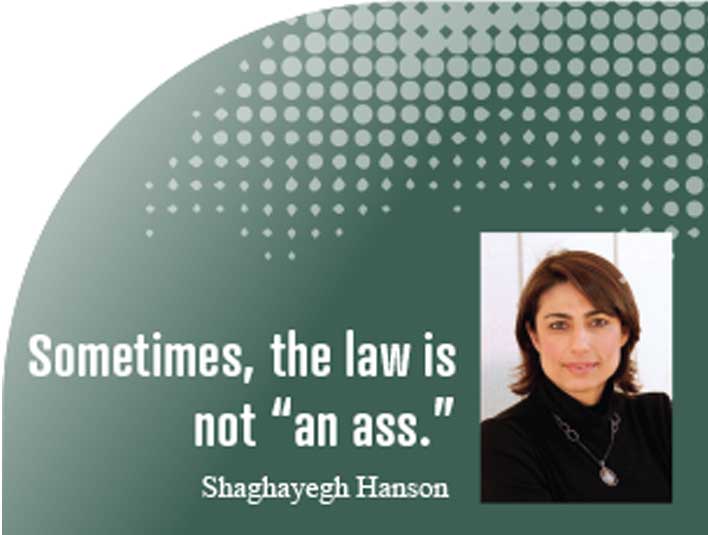Sometimes, the law is not “an ass.”
Shaghayegh Hanson
Sometimes, the law is not “an ass.”
I hope you won’t mind me taking you into my lawyer’s world briefly, because something truly groundbreaking has happened in California that everyone, especially all the other states in the U.S., should know about by now and welcome. As ever, at least for me, a literary reference makes for a good starting point.
In Oliver Twist, when the odious Mr. Bumble is told “the law supposes your wife acts under your direction,” he retorts, “If the law supposes that, the law is an ass—an idiot. If that’s the eye of the law, the law’s a bachelor; and the worst I wish the law is, that his eye may be opened by experience — by experience.” Not just humorous, but often true. Thanks to Charles Dickens’ timeless contribution to common English phrases, I have heard this quote—abbreviated to “the law is an ass”—many times during my legal career.
Now, out of all the states in the U.S., California has passed legislation that withstands Mr. Bumble’s critique. That legislation, passed in the wake of nationwide protests over the murder of George Floyd, is the Racial Justice Act (RJA), which has been in effect since January 1, 2021, and is now beginning to have some concrete results. In passing the Act, the Legislature cited language from a U.S. Supreme Court case resonant of Mr. Bumble’s wish that the law should be based on real life experience: “The way to stop discrimination on the basis of race is to . . . apply the Constitution with eyes open to the unfortunate effects of centuries of racial discrimination.”
Designed to root out racial bias in policing, prosecution, and sentencing, the RJA prohibits the state from seeking or imposing a conviction and sentence “on the basis of race, ethnicity, or national origin.” A tall order, given the well-documented fact that Black men are more than eight times as likely to be imprisoned as white men, three times more likely to be killed by police officers, and often given more severe punishments than white men under the same circumstances. Such disparities extend to other racial groups, such as Hispanic individuals. There is no race-based justification for these statistics. For example, although Black individuals are stopped and searched by police in greater numbers than white individuals, the rates of finding some sort of contraband on white individuals is notably higher.
Historically, a defendant claiming racial bias has had to prove that someone (e.g., a police officer, the prosecutor, the judge, jury members) or some part of the system was intentionally racist. Of course, this is not a problem when discrimination is obvious, usually in extreme and blatant circumstances. But—and this is the groundbreaking part—the Legislature acknowledged that often proof of racist intention is “nearly impossible to establish” because: (1) “purposeful discrimination is often masked and racial animus disguised;” and (2) “all persons possess implicit biases” which “although often unintentional and unconscious, may inject racism and unfairness into proceedings similar to intentional bias.”2 Therefore, the RJA does not require proof of purposeful discrimination. Instead, a defendant may use studies and data, and seek a prosecutor’s own historical records, to show, for example, that “the prosecution more frequently sought or obtained convictions for more serious offenses against people who share the defendant’s race, ethnicity, or national origin in the county where the convictions were sought or obtained.”2 If a defendant is successful in making a showing of racial bias, it could lead to important remedies, such as making him ineligible for the death penalty, or a dismissal of certain charges or enhancements, or a reduction of years in the sentence, or, in the case of a biased jury, the right to a new jury. This is, of course, just a snapshot of the RJA; to learn more follow the link in footnote 2.
Racial bias, in various forms, is nothing new. Even before George Floyd’s murder, the Supreme Court recognized racial bias as a “familiar and recurring evil that, if left unaddressed, would risk systemic injury to the administration of justice.” California, alone, has seriously heeded the call by enacting the RJA. I defer to Mr. Bumble’s reasoning as to what that makes other states’ laws.
1- Two other states, Kentucky and North Carolina, have also passed Racial Justice Acts, but, unlike California’s Act, they are limited to death penalty sentences and North Carolina’s has since been repealed.
2- https://leginfo.legislature.ca.gov/faces/billNavClient.xhtml?bill_id=201920200AB2542 (Schuette v. Coalition to Defend Affirmative Action, Integration and Immigrant Rights and Fight for Equality By Any Means Necessary, 572 U.S. 291, 380-81 (2014) (Sotomayor, J., dissenting)).
3- California Penal Code section 745, subdivision (a).
4- https://www.dailyjournal.com/mcle/1200-court-of-appeals-in-young-v-solano-county-opens-the-door-to-racial-bias-complaints
5- Racial Identity Profiling Advisory Board, Annual Report (2022) at 13.
6- Pena-Rodriguez v. Colorado (2017) 580 U.S. _, 137 S.Ct. 855, 868.

















